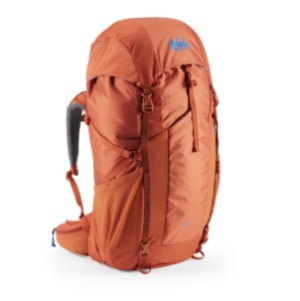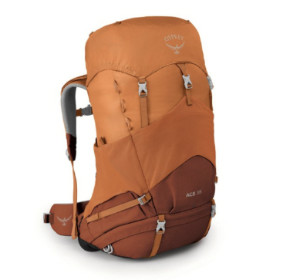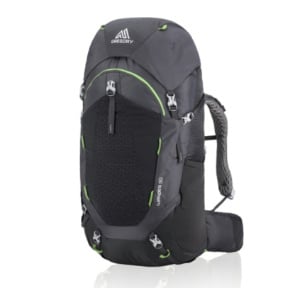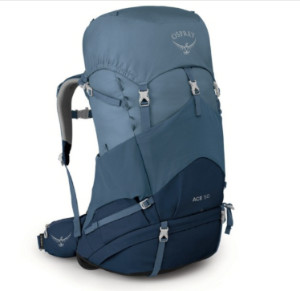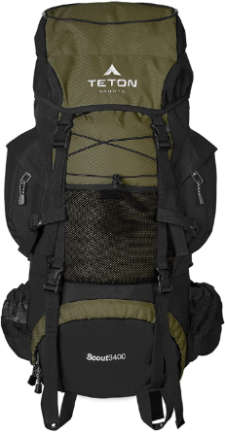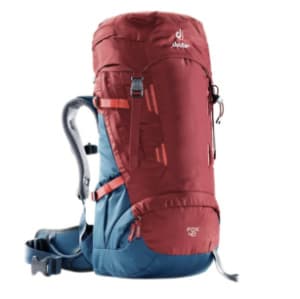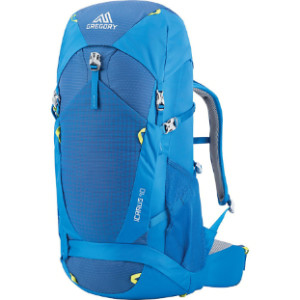Buying a kid’s backpack is very different from buying an adult backpack because kids have smaller physical proportions. They also grow very quickly so you want to make sure that you purchase a backpack that can be adjusted over time. In addition to bringing them close to nature, the accomplishment they feel at being able to carry everything they need on their backs over miles of backcountry terrain is a great confidence builder. However, a well-chosen, properly-packed backpack is probably the single biggest difference between misery and enjoyment on the trail.
Here are the top 10 backpacks we recommend for kids. All of them have adjustable-length torsos to account for their growth as they get older.
1. REI Tarn 40 Pack – Kid’s
2. Osprey Ace 38
3. Gregory Wander 50 Youth Backpack
4. REI Tarn 65 Pack – Kids
5. Osprey Ace 50
6. ULA Spark Backpack
7. Teton Sports Scout 3400
8. Deuter Fox 40
9. Gregory Icarus 40 Backpack
10. Amazon Basics 55
How to Buy a Kid’s Backpack
Kid’s Backpack Volume
Avoid buying a backpack that has too much volume. Overpacking is tempting; it’s a natural tendency to fill the pack all the way, resulting in a far heavier pack than necessary. Almost as bad is an under-packed backpack, with its contents bouncing jauntily at every step and the top pocket flopping loosely even though its straps are fully tightened. The 40 to 50 liter capacity range makes a great choice for the young backpacker, big enough to hold their personal gear and a share of group gear for a weekend trip.
Appropriate Gear Weight for Kids
Ensure that the load your child is carrying is appropriate for their size and stature. A 20-pound pack is a much more difficult burden for a 60-pound child than a 100 pound one, no matter what physical condition the child is in.
Torso Length Adjustability
Look for adjustability in the pack in a couple of key areas. The torso length adjustment allows the pack to accommodate growth. A nice feature on a pack is the ability to adjust the torso length while it’s being worn. This lets you dial in the fit of the pack with much less trial and error. Where the waist belt sits on the torso needs some experimentation to find the right spot, and that often necessitates ongoing torso length adjustments.
Hip Belt Padding
Young backpackers lack the amount of, shall we say, padding around the waist. This gives a couple of important considerations. Less prominence to the hips and waist means that a low-slung pack will not transfer weight to the lower body as well as on an adult. As a result, most kids will need to wear the hip belt higher than an adult would. There isn’t as much cushioning between skin and bone as with adults, so ample padding in the waistband prevents raw spots and bruising. The hip belt should be able to be worn comfortably but still be tightened further; if it is fully cinched down in the store, it will be too loose on the trail.
Complaints of Backpack Discomfort
Hit the trail with the expectation that the pack may need to be adjusted frequently, especially for a new backpacker. Sometimes I swear my children have grown a couple of inches overnight! A few minutes ensuring the proper fit can make for a far happier trip. If your child is complaining about hurting, take the time to find out where they’re feeling pain or pressure, then take steps to alleviate the situation. (Hint: I’ve solved a lot of complaints simply by grabbing the carry strap on the pack, raising it up, tightening the hip belt, and loosening the shoulder straps a touch.)
Ultralight Backpacks for Kids
While the temptation is there to purchase an ultralight pack and save weight on a child’s body, very few ultralight packs feature the adjustability needed for a kid’s pack to last longer than a year or so. I hope that will change when ultralight backpacking companies discover the youth market, but today’s ultralight backpacks aren’t built or priced for kids with rapid torso-length growth spurts.
Shoulder Straps
Pay attention to where the shoulder straps hit. They will be too far apart on many adult packs, pulling the points of the shoulders backward. The straps should ideally rest where the trapezius muscle meets the shoulder blade. This keeps the strap on the meaty part of the shoulder rather than the bonier end of the shoulder blade. The pack should be supported with the shoulder in a natural posture rather than having to pull forward or up, which causes muscular fatigue.
Load Lifters
Many kid’s backpacks come without load lifters. While I likely wouldn’t consider a non-ultralight adult backpack without load lifters, it’s not a requirement in a kid pack because torso length adjustment serves the purpose. A good test to make sure shoulder straps without load lifters are set properly is to have the wearer shrug their shoulders. If the shrug has more than minimal resistance from the weight of the pack, the straps are likely too low.
Inexpensive Backpacks
While it’s tempting to buy an inexpensive pack, beware of poor quality discount packs. Look for reinforced stitching at weight-bearing points, especially where the shoulder straps and hip belt meet the bottom of the pack. The buckles, especially the hip belt buckles, should feel beefy and substantial without any flex—if you don’t feel like you can tighten the buckle vigorously, it likely will not hold up to the stress of backpacking.
Packing Technique
With younger backpackers, it’s also important to pay attention to proper packing techniques. There’s a temptation to hang a tent and/or sleeping bag from the straps or tie points toward the bottom of the pack. This throws the balance off by pulling the wearer backward from the shoulders. Relocating the hanging item between the pack body and top pocket transfers the weight to the hips and legs instead.
Resale Value
While investing in a good-quality backpack with the full knowledge that your child will likely grow out of it in a few years may feel daunting, most will have good resale value to offset some of the cost when they move to larger packs and adventures. The investment in a proper fitting pack now will contribute to happier miles, for both of you.
SectionHiker is reader-supported. We independently research, test, and rate the best products. We only make money if you purchase a product through our affiliate links. Help us continue to test and write unsponsored and independent gear reviews, beginner FAQs, and free hiking guides.
About the author
Carl Nelson developed his interest in the outdoors on childhood family road trips that included many National Parks. He was introduced to backpacking through Boy Scouts in the 1980s. He refined his interest and skills in college as a trip leader for the Vanderbilt University Outdoor Recreation program, culminating in leading a week-long backpack in the Grand Canyon three times. He is an Eagle Scout and Assistant Scoutmaster, frequently serving as the adult advisor for his troop’s outdoor activities. His backpacking experience ranges from his home state of Tennessee to the Appalachians, the Rockies, the Cascades, Philmont Scout Ranch, and China. Carl is an avid photographer and reader, a self-proclaimed gear nerd, and an unabashed lover of maps.

